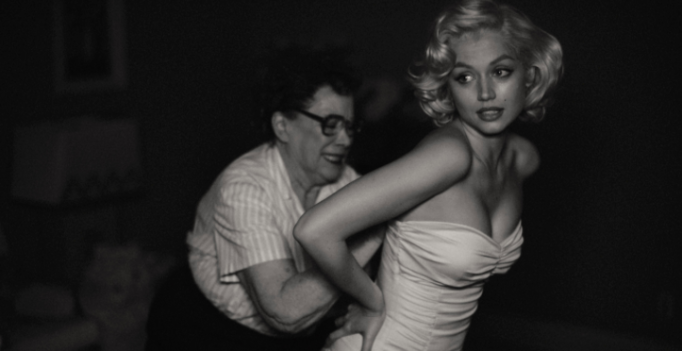Based on Joyce Carol Oates’ fictional novel of the same name, written and directed by Andrew Dominik (The Assassination of Jesse James by the Coward Robert Ford) and earning a rare adults-only NC-17 rating, Blonde is a disturbing examination of Marilyn Monroe (aka. Norma Jeane Mortenson) and the cruel behaviour she experienced on her search for a companion.
Blonde, for better or worse, is not your typical biopic. Clocking in at close to 3 hours with plenty of experimental sequences to boot, Dominik’s film is an unrelenting vessel that feels like two different types of movies. It begins as a spiritual biopic, much like the recent Bowie cinematic kaleidoscope Moonage Daydream. But instead of focusing on an artist’s craft, Blonde places all of its effort to emulate Mortenson’s unnerving emotions that contributed to her inner discouragement. People around her were either trying to abandon her or exploit her. Desperate for a personal connection, it’s suggested that Mortenson took off to Hollywood to pursue this.
This is when Blonde is at its most unreliable degree. Dominik skates around Norma Jeane’s timeline to find similarities between different relationships that lacked fulfilment; from her roots in an abusive household as a kid to romances that ended in trauma. It’s clear that Blonde is an emotional adaption and sensory breakdown of its subject, and its requesting the audience to trust the information surrounding the dynamics. These are tough conditions to initially agree to but, once the audience does, Blonde becomes accessible on the frequency it aspires to work on.
In the later periods of Mortenson’s career, where she has found people who seemingly care about her, the narrative pulls its focus and readjusts to the lack of control she now has on her life. Through her own identity crisis that was enabled by so many outsiders and her traumatizing, failed pregnancies, Mortenson can’t sustain her dreams to embrace a new trajectory which includes new chapters like transitioning her acting and starting a family. Blonde becomes more biographical while taking creative liberties, such as as taking on more nightmarish traits as we see deranged crowds pile on to Norma Jeane during her most vulnerable moments. The narrative’s merge is also, surprisingly, smoother than expected despite how jarring the tones are on their own. Ana de Armas (Knives Out) as Mortenson/Monroe gives the performance of her career. She rattles you and breaks your heart, and refuses to break your concentration. The pairing of her acting and Dominik’s movie is akin to Ellen Burstyn’s Oscar-nominated role in Darren Aronosky’s Requiem for a Dream.
Blonde is deliberately distraught and endlessly fascinating through its challenging and unrestrained filmmaking. It’s an excellent, award-worthy movie and, at the same time, I have a hard time recommending it because it’s so extremely difficult to endure at points. Considering Blonde will be available to stream soon on Netflix (its currently only playing in theatres as part of an exclusive engagement), it might be best viewed at home because of the opportunity to pause the movie to take a breather and recollect yourself .
**********
Do You Tweet? Follow These Tweeple:
Addison Wylie: @AddisonWylie





Be the first to comment